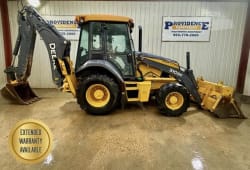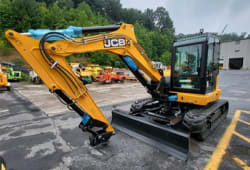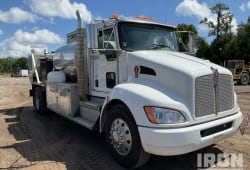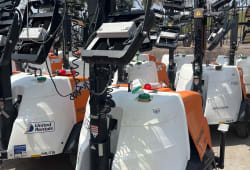Comprehensive Guide on Using Flatbed trailers to Improve Your Business?
7 Lectura mínima
)
noviembre 25, 2023
Flatbed trailers play a crucial role in the transportation and logistics industry, offering a versatile solution for businesses across various sectors. The efficient use of flatbed trailers can significantly impact a company's operations, leading to improved efficiency and cost-effectiveness. In this article, we will explore the advantages of flatbed trailer utilisation, key considerations when selecting flatbed trailers, best practices for efficient use, case studies of successful business models, challenges and solutions, and the future trends shaping the flatbed trailer industry.
Advantages of Flatbed Trailer Utilisation
Flatbed trailers offer several advantages that make them a preferred choice for businesses involved in transporting goods. One of the key benefits is their versatility in cargo transportation. Unlike enclosed trailers, flatbed trailers provide an open platform that can accommodate a wide range of cargo types, sizes, and shapes. This adaptability makes them ideal for industries with diverse transportation needs, such as construction, agriculture, and manufacturing.
Moreover, flatbed trailers are known for their cost-effective solutions. The open design allows for more efficient loading and unloading processes, reducing the time and labour required for these tasks. Additionally, the absence of walls and roofs simplifies the construction of flatbed trailers, resulting in lower manufacturing costs. These cost savings can contribute to a more competitive pricing structure for businesses utilising flatbed trailers in their operations.
Another advantage of flatbed trailer utilisation is the enhanced loading and unloading efficiency they offer. The absence of restrictive walls allows for quick and straightforward loading, especially for oversized or irregularly shaped cargo. This efficiency not only saves time but also ensures that the cargo is secured properly, reducing the risk of damage during transportation.
Key Considerations for Flatbed Trailer Selection
When choosing a flatbed trailer for business operations, several key considerations come into play. Size and weight capacity are critical factors that depend on the specific needs of the business. It's essential to select a flatbed trailer that can accommodate the size and weight of the typical cargo to be transported.
Material and construction are also important considerations. The durability and strength of the flatbed trailer depend on the materials used in its construction. Businesses should assess whether the trailer's materials can withstand the demands of their operations and the environmental conditions it will encounter.
Furthermore, specialised features tailored to specific industries can enhance the utility of flatbed trailers. For example, removable side panels or adjustable load securing mechanisms can be crucial for businesses dealing with irregularly shaped or oversized cargo.
Best Practices for Efficient Flatbed Trailer Utilisation
To maximise the benefits of flatbed trailer utilisation, businesses should adopt best practices in their operations. Proper loading techniques are paramount to ensure the safety and stability of the cargo during transportation. Distributing the weight evenly and securing the cargo with appropriate restraints are essential steps in this process.
Securing cargo for safe transport is a critical aspect of flatbed trailer utilisation. Depending on the type of cargo, businesses may need to use straps, chains, or other securing methods to prevent shifting or falling during transit. Adhering to industry standards and regulations for cargo securement is crucial to ensure compliance and safety.
Regular maintenance and inspection of flatbed trailers are also essential best practices. Routine checks of tires, brakes, lights, and other components can prevent breakdowns and accidents. Proactive maintenance not only extends the lifespan of the trailer but also reduces the risk of unexpected issues during transportation.
Case Studies: Successful Business Models with Flatbed Trailers
Several industries have successfully integrated flatbed trailers into their business models, demonstrating the versatility and effectiveness of this transportation solution.
In the logistics and supply chain sector, companies have optimised their operations by utilising flatbed trailers. The ability to transport a variety of goods, including oversized or bulk items, has allowed these businesses to offer comprehensive and flexible shipping solutions to their clients. This adaptability has resulted in increased customer satisfaction and loyalty.
The construction industry has also benefited significantly from flatbed trailer utilisation. Transporting construction materials, equipment, and prefabricated components is streamlined with the open design of flatbed trailers. Construction companies can efficiently move large and heavy loads to and from construction sites, contributing to project timelines and cost-effectiveness.
Agricultural businesses have found success in using flatbed trailers for the transportation of crops, machinery, and livestock. The open design allows for easy loading and unloading of agricultural products, and the versatility accommodates the diverse needs of the industry. This has led to increased efficiency in the agricultural supply chain.
Challenges and Solutions in Flatbed Trailer Utilisation
While flatbed trailers offer numerous benefits, businesses may encounter challenges in their utilisation. Weather and environmental factors, such as rain, snow, or extreme temperatures, can pose risks to cargo and impact transportation schedules. Businesses must develop contingency plans and invest in weather-resistant packaging or additional securing measures to mitigate these challenges.
Regulatory compliance and safety measures are critical considerations for businesses utilising flatbed trailers. Adhering to local and international transportation regulations ensures the safety of both the cargo and the individuals involved in the transportation process. Businesses should stay informed about any changes in regulations and invest in training programs to educate their personnel on compliance requirements.
Technological innovations play a significant role in overcoming challenges in flatbed trailer utilisation. Advanced tracking systems, real-time monitoring, and communication technologies enable businesses to keep track of their cargo's location and condition throughout the transportation process. These innovations enhance transparency, security, and overall efficiency in flatbed trailer operations.
The Role of Training and Education in Flatbed Trailer Operations
Effective training and education play a pivotal role in ensuring the safe and efficient utilisation of flatbed trailers. Businesses must invest in comprehensive training programs for their personnel, covering aspects such as proper loading techniques, cargo securement, and adherence to regulatory standards. Well-trained operators not only enhance operational efficiency but also contribute to the overall safety of the transportation process.
Moreover, educational initiatives within the industry can foster a culture of continuous improvement. Knowledge-sharing platforms, seminars, and workshops provide valuable insights into emerging trends, best practices, and innovations. This collaborative approach to learning ensures that businesses stay abreast of the latest developments, allowing them to adapt and thrive in a rapidly evolving landscape.
Future Trends in Flatbed Trailer Technology
As technology continues to advance, several trends are shaping the future of flatbed trailer utilisation in business operations.
Integration of the Internet of Things (IoT) for real-time monitoring is a prominent trend. IoT sensors can provide data on cargo conditions, trailer performance, and location in real time. This information allows businesses to make informed decisions, optimise routes, and enhance overall efficiency.
The use of sustainable and eco-friendly materials in flatbed trailer construction is another future trend. As businesses increasingly prioritise environmental sustainability, the adoption of trailers made from recycled materials or those with a reduced carbon footprint is likely to become more prevalent.
Automation and robotics in loading and unloading processes represent a cutting-edge trend in flatbed trailer technology. Automated systems can streamline these tasks, reducing the need for manual labor and enhancing overall efficiency. Robotics also contributes to improved safety by minimising the risk of accidents during cargo handling.
The End
The utilization of flatbed trailers offers businesses a versatile and efficient solution for transporting goods. The advantages of flatbed trailers, including versatility, cost-effectiveness, and enhanced loading efficiency, make them a valuable asset for various industries. When selecting flatbed trailers, businesses must consider factors such as size, weight capacity, material, and specialized features.
Implementing best practices, including proper loading techniques, cargo securement, and regular maintenance, is crucial for maximizing the benefits of flatbed trailer utilization. Through case studies, we've seen how businesses in logistics, construction, and agriculture have successfully integrated flatbed trailers into their operations, leading to increased efficiency and customer satisfaction.
Visit Boom & Bucket to buy and sell your machinery.

Caleb Woods is an experienced content specialist and an editor at Boom & Bucket, blending his journalism background with expertise in the heavy equipment industry. He delivers engaging, informative content to help professionals stay informed and make smarter decisions in the machinery market.













